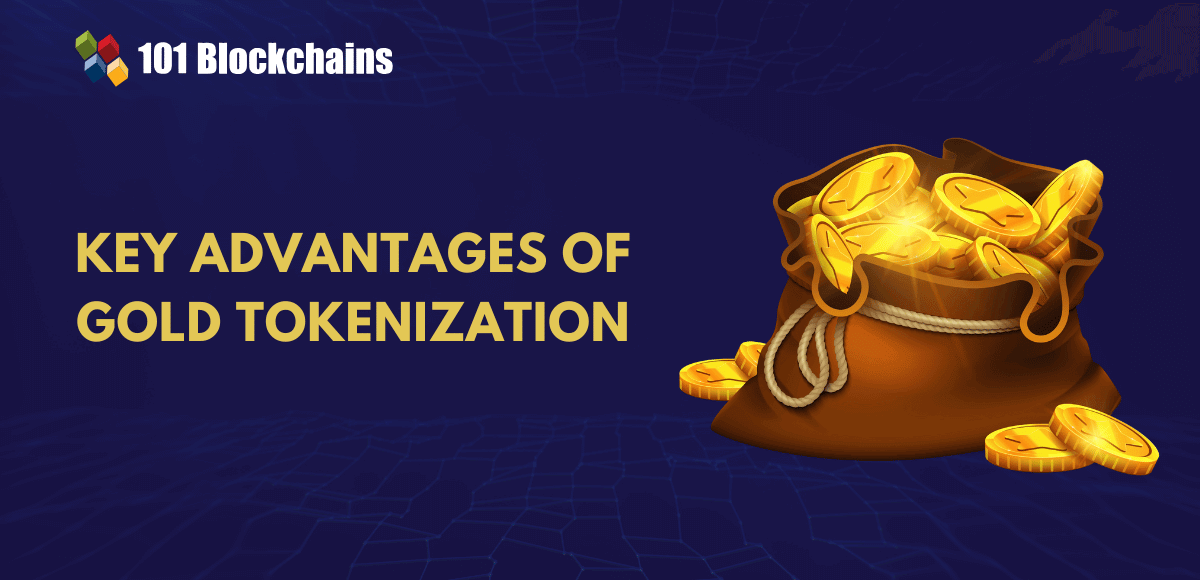Blockchain technology and its impact on the global economy

Blockchain was seen as a technology that would power cryptocurrencies until the world discovered other utilities. You can find a variety of blockchain applications, from NFTs to next-generation web3 solutions. As the hype around blockchain technology grows, so does interest in its impact on the global economy. Business leaders and entrepreneurs want to find answers to questions like ‘How will blockchain impact the global economy?’ This is because they are uncertain about the impact blockchain will have on their business. You will learn valuable insights into the impact of blockchain technology on the global economy.
Build your identity as a certified blockchain professional with 101 Blockchains’ blockchain certification, designed to provide enhanced career prospects.
Wave of blockchain evolution
The best way to understand blockchain’s impact on the global economy is to learn about the different generations of blockchain. Blockchain was introduced as a solution to the challenges of the traditional financial system. The primary application of blockchain technology in its early stages has focused on cryptocurrencies.
Developers have discovered that blockchain can be used in applications other than cryptocurrency. Ethereum and smart contracts have changed the traditional view of blockchain technology and opened the door to creating decentralized apps. Smart contracts have helped make dApps more effective than centralized solutions by eliminating intermediaries and ensuring more efficient contract execution.
The economic and social impact of blockchain technology has become more pronounced in the next generation of blockchains as more mature solutions are introduced. You may have heard about the ‘NFT craze’ that has caused a new revolution in popular culture. Digital assets have provided a new definition of ownership of digital and physical assets with the help of blockchain. In addition to NFTs, blockchain technology promotes metaverse development and supports the growth of web3.

The road to a blockchain-based economy
Blockchain didn’t emerge as a powerful force in the global economy in a fortnight. The various stages of blockchain deployment have focused on distinct themes and goals that can explain how blockchain has consolidated its dominance in the global economy. The first phase of blockchain deployment focused solely on information sharing and transaction processing. Blockchain technology has found applications for data sharing and communication, and businesses have also adopted blockchain for a variety of internal processes.
Next-generation blockchain deployments introduce advanced use cases such as transaction management and regulatory reporting. Blockchain provides an environment for flexible data storage and manipulation with diverse infrastructure from different providers. The most important highlight of the existing wave of blockchain adoption is the use of distributed ledger technology in existing solutions. The organization believes that blockchain can help introduce new efficiencies to business workflows and operations.
Business leaders need to think about the impact blockchain technology will have on the financial sector as well as the industries in which they operate. The many examples of blockchain integration into critical infrastructure for a variety of critical functions demonstrate the urgency of thinking about the broader implications of the technology. The global economy will undergo tremendous changes during the transition to a blockchain-based economy. Consider the impact of plans to replace existing infrastructure for payments, asset management, and trading.
Even though the dream of a fully decentralized future remains uncertain, blockchain will bring radical changes to the global economy in the coming years. Blockchain’s most disruptive impact centers around the disintermediation of legacy infrastructure owners. Another notable event that could expand blockchain’s dominance over the global economy is legal support for asset ownership and transfer through blockchain.
Positive aspects of the blockchain revolution for the global economy
The continued growth of blockchain technology and new solutions for scalability, including cross-chain bridges, have established a strong foundation in the technology landscape. Business leaders and entrepreneurs need to know about the potential impact of blockchain technology to prepare for the challenges ahead.
Insights into blockchain technology’s impact on the global economy can help you find the ideal approach to leverage it. The best way to help you measure the impact of blockchain technology on your business and economy is with an overview of its unique characteristics. The following benefits of blockchain demonstrate how the technology will positively impact the global economy.
The biggest characteristic of blockchain, which will have a huge impact on the global economy, is its decentralized nature. Blockchain provides a network of nodes for which all participants are responsible, rather than a single individual or organization. For example, multiple stakeholders in a supply chain can benefit from decentralization to find the information they want across the chain.
When it comes to economic impact, blockchain can help businesses and customers save money through the benefits of faster transaction processing and limiting reliance on manual tasks. Most discussions about blockchain use cases transforming the global economy focus on the financial sector. Financial services organizations have used blockchain to streamline their transaction settlement processes, resulting in significant cost savings. The absence of brokers or middlemen is another notable factor that contributes to cost savings.
The companies have insisted that they follow standards for responsible sourcing of raw materials and provide original products to consumers. Throwing blockchain into the mix allows businesses to actually show customers where their products come from. The visibility nature of blockchain also helps increase inventory management efficiency and resolve customer inquiries more easily.
Blockchain stands out as one of the strong contenders to transform the global economy through immutability. The immutability property indicates that once a transaction is registered on the blockchain, it cannot be changed or deleted. Immutability can help maintain a permanent record of information, providing better audit coverage with enhanced security.
Immutability ensures the integrity of blockchain networks and enhances security. Blockchain prevents unauthorized activity and fraud by facilitating cryptographic encryption of data. Additionally, storing your data on multiple nodes keeps your sensitive data safe from hackers. Another interesting aspect of blockchain that enhances security is its ability to anonymize data to address privacy concerns.
Enroll for the Certified Blockchain Security Professional (CBSE) certification today and understand how to perform blockchain threat modeling and vulnerability assessment.
Blockchain use cases that will transform the global economy
Blockchain has the potential to create an entirely new digital economy and disrupt a variety of sectors. The impact of blockchain technology on the financial sector is one of the most striking examples of its disruptive power. Blockchain architecture has expanded beyond cryptocurrencies in the financial industry with the introduction of decentralized finance, or DeFi, solutions.
Blockchain solutions can also help drive digital transformation of supply chain processes. The main benefit of blockchain in supply chain processes is improving transparency of various processes. The use of blockchain in supply chains has reduced supply chain fraud while improving efficiency and product authentication.
Smart contracts on blockchain can offer promising opportunities for automation of a variety of processes, including complex business workflows and legal contracts. Blockchain architecture also provides the basis for asset tokenization, which allows physical and digital assets to be represented as digital tokens. Blockchain’s use cases in digital asset management will open up new opportunities for investing in digital artwork, real estate, and other assets.
Discovering the challenges of blockchain implementation
The impact of blockchain technology on the global economy will become more visible as blockchain adoption grows at a steady pace. Additionally, to understand why blockchain is still gaining momentum to transform the global economy, you need to learn about the challenges of blockchain implementation. First of all, infrastructure issues have hindered blockchain adoption in many emerging countries. Lack of access to reliable power and internet connectivity significantly reduces accessibility to blockchain features.
The biggest factor hindering the growth of blockchain is lack of awareness of the technology. Utilizing blockchain technology requires technical knowledge, and skilled blockchain experts are in short supply. Regulatory uncertainty and differing views on the legal validity of blockchain have also limited its adoption.
Another notable challenge in implementing blockchain is the initial cost burden. The cost of building infrastructure and ongoing maintenance and development of dApps has also been a hurdle for many projects. Organizations have discovered a variety of ways to overcome these challenges and adopt blockchain technology with optimal use of resources.
The economic impact of blockchain technology extends beyond cryptocurrency adoption. Blockchain has introduced powerful advancements that have broader implications for the world, including DeFi solutions, NFTs, and the Metaverse. Blockchain has also found application in asset tokenization, supporting the tokenization of both physical and digital assets. Blockchain use cases have offered unique advantages such as decentralization, transparency, cryptographic security, and automation through smart contracts.
Do you want to know about blockchain implementation and strategies for blockchain project management? Enroll in the Blockchain Technology – Implementation and Strategy course today!
final thoughts
The social impact of blockchain technology will also play an important role in fostering its growth. Popular culture has embraced blockchain and cryptocurrency as future technologies. Moreover, blockchain’s unique characteristics make it a strong contender to transform the global economy. Business leaders must keep an eye on the benefits of blockchain and the challenges of blockchain implementation to take full advantage of blockchain’s capabilities. Discover new insights into how blockchain technology can impact your business today.

*Disclaimer: This article should not be considered, and is not intended to provide, investment advice. The statements made in this article are not investment advice and should not be taken as such. 101 Blockchain is not responsible for any loss suffered by anyone relying on this document. Do your own research!



